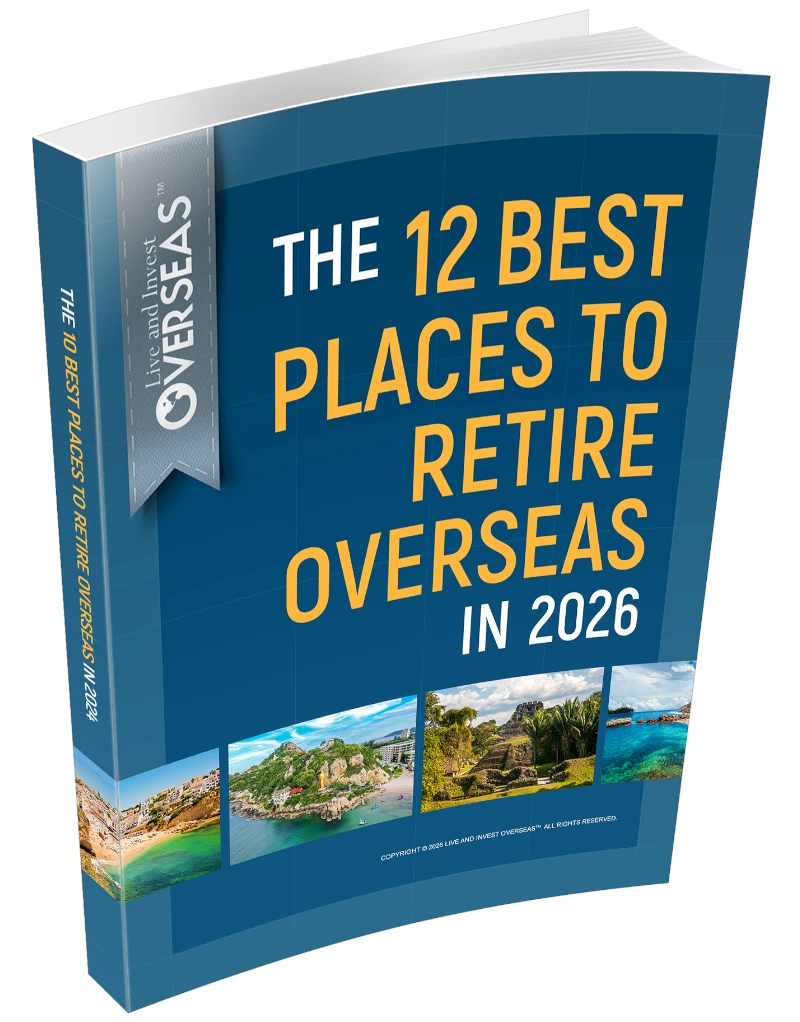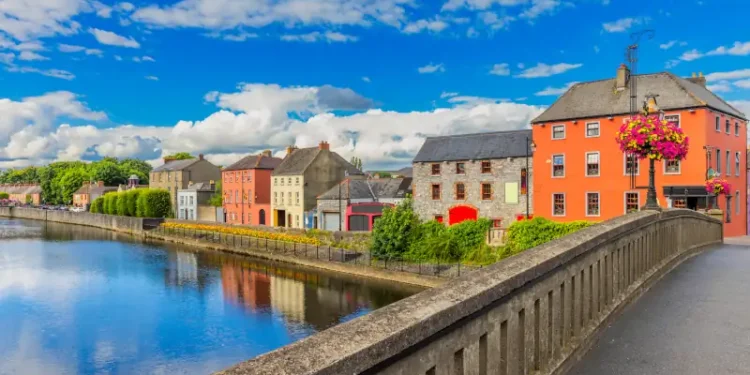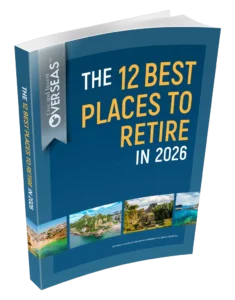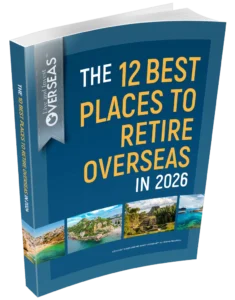What if you could go back to a simpler, sweeter time…
To a time when you knew your neighbors and they knew you… when you were part of a tight-knit community… able to embrace life in a quiet, safe little place that resisted change and preferred to keep things… well… simple and sweet.
This may seem like a pipe dream in today’s world… so we put the challenge to ourselves.
Where, we wondered, could you escape this 2025 to a modern-day Mayberry?
These three very special spots… all in the Old World… came to mind…
Città Sant’Angelo, Italy
Monthly Budget: $2,000
Monthly Rent: $950
Perched on a gently sloping hilltop, with sweeping views from Gran Sasso Mountain to the Adriatic Sea and rolling hills of vineyards and olive groves in between, Città Sant’Angelo feels like a world removed from time.
This ninth-century medieval town, nestled between two rivers, is home to magnificent palazzi, piazzas, churches, and monasteries… but also, perhaps more important in the context of our current world, to a way of life that hearkens back hundreds of years.
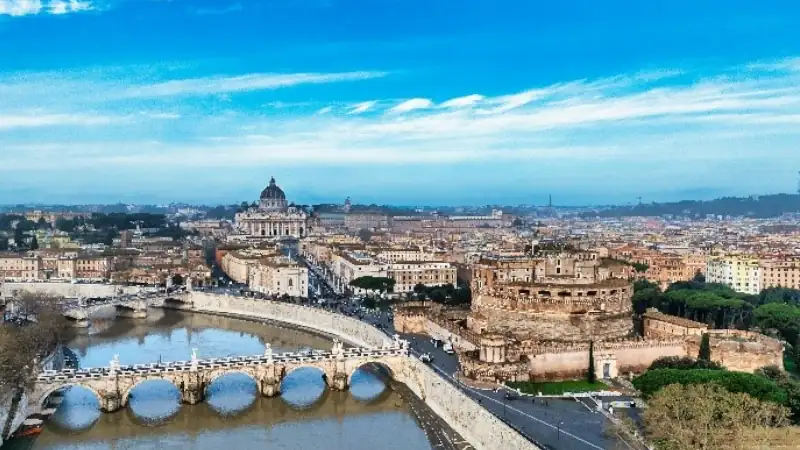
Little has changed here over the centuries, and that’s the way folks here like it. Quaint storefronts house butchers, bakers, pasta makers, and pharmacists. Locals pop in from one to the next for their daily shopping then gather in the evenings to enjoy their public spaces altogether.
This hamlet of about 15,000 is one of the culturally richest in Italy’s Abruzzo region. Abruzzo is one of the greenest regions in Europe, offering mountains (with over a dozen ski resorts) and 129 kms of coastline (with seven beach resorts—more than any other single European region).
Sant’Angelo is a designated a “Città Slow” (Slow City), referring to its commitment to preserve tradition and resist “progress.” It’s a bustling, active little city, with jazz concerts and theater. Its ancient church draws worshippers from across the region.
Sant’Angelo is also known as a Città del Vino and a Città dell’Olio—City of Wine and City of Oil—producing an abundance of both. This is a serious art town, hosting works from the Venice and Istanbul biennales.
With a renowned hospital that draws visitors from all over the country as well as assisted living facilities, a mental health institution that specializes in Alzheimer’s, and a rehabilitation center, this town is perfect for someone looking to age-in-place surrounded by history, Old World culture, and fine cuisine.
Like too much of Italy, Sant’Angelo suffers from a declining population. In the historic center you’ll find many vacant but architecturally interesting houses for sale at bargain prices. The mayor has worked to streamline the buying process to entice buyers. He’s managed to reduce the bureaucracy, to lift certain restrictions, and to forge partnerships with business groups and tour operators to attract investment and innovation.
While the big appeal of Sant’Angelo is the ancient, modern conveniences are well represented. Nearby is an outlet shopping center, the biggest in the region, as well as a cinema and an Ikea-like furniture store.
Offering small-town living, tranquility, a close-knit community supported by easy access to modern conveniences, Città Sant’Angelo is the best of all worlds and a tempting escape from the troubles of our current world.
Graiguenamanagh, Ireland
Monthly Budget: $3,000
Monthly Rent: $1,000
Graiguenamanagh (pronounced Graig-na-MAN-ah) is a happening little village on the west bank of the River Barrow, where, during the summer months, colorful barges moor along the shores, families swim and coax each other down from the landmark diving boards, and the annual regatta attracts rowing enthusiasts.
Graiguenamanagh, the “village of the monks,” known locally as Graig, is one of Ireland’s hidden gems. This small, friendly community is appreciated for its tranquility and feeling of traveling back in time. If you’re arriving from New York or Los Angeles, the lifestyle can be a shock… or just the change you’re looking for.
Founded in 1204, Duiske Abbey is one of the largest and grandest of the 34 Cistercian abbeys in Ireland and the town’s historic anchor. The monks who called the abbey home are remembered by a series of statues dotted around the town.
The town today is more defined by its remarkable stretch of river than its monastic past. Graiguenamanagh famously supplied the River Barrow, the second-longest in the country, and its commercial enterprises with its most skilled boatmen. The boatman is a long and highly respected member of Graig society.
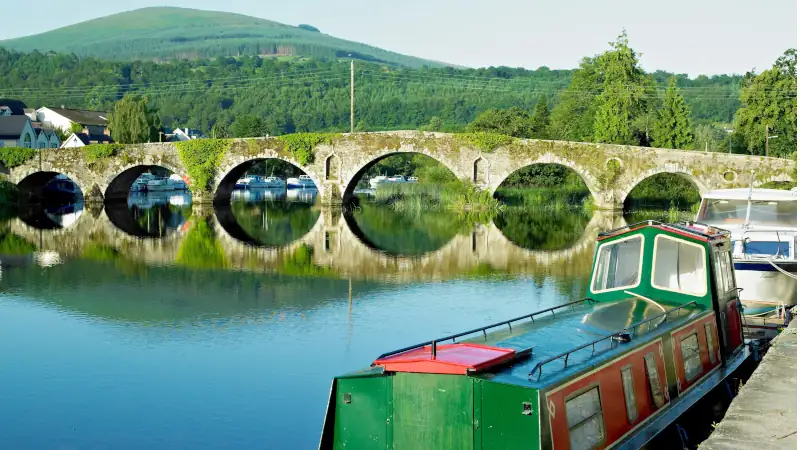
Activity on the Barrow canal is recreational these days. On a summer’s day, if you’re not in the water yourself, take a seat on the shore and watch the swimmers, divers, kayakers, fishing boats, and small cruisers drifting slowly by. On land you can play golf and explore the old estates, castles, and formal gardens.
In August each year, Graig becomes the ‘Town of Books’ for a literary lover’s dream festival. Booksellers pitch up all around the town and bibliophiles are treated to three days of readings, talks, performances, and workshops.
This is a close-knit community. The people of Graig look out for each other. Crime is virtually nonexistent.
At home in Graig, you’re a 25-minute drive from Kilkenny city, 20 minutes from the town of New Ross in County Wexford, and just under two hours from Dublin. For day-to-day needs, you’ll find most everything you need in Graig town.
The weather in Ireland is famously wet and rainy. On the other hand, it is also mild with no temperature extremes. And the “Sunny Southeast,” where Graig lies, enjoys less rainfall and more hours of sunshine per year than the rest of the country.
And, remember, they speak English in Ireland. Sort of.
Monthly budget: $2,500
Monthly rent: $1,000
We were the first to shine the spotlight on Portugal. That was more than a decade-and-a-half ago. This is no longer Europe’s best-kept secret. It remains, however, one of your best options for a sweet, simple life anywhere.
Portugal’s Algarve region has been popular among foreign retirees since WWII when a first wave of former British officers fell under its spell. Attracted by a sunny climate many had become used to from service in Asia and the Middle East, they also appreciated the low cost of living.
Thanks to this long history with the British Empire, English is commonly spoken. Today, there are plenty of non-British foreigners in the Algarve, too, including good numbers of North Americans.
Despite the large foreign population, the Algarve remains authentically Portugal. This is a land of medieval towns and fishing villages, open-air markets, cobblestoned streets, and whitewashed houses with lace-patterned chimneys, all surrounded everywhere by fig, olive, almond, and carob trees.
We particularly like the tranquil fishing village of Ferragudo, one of the Algarve’s most charming. With spectacular beaches and stunning views, Ferragudo’s people spend their time out-of-doors, enjoying the sunshine and long walks along their cliffs and shore.
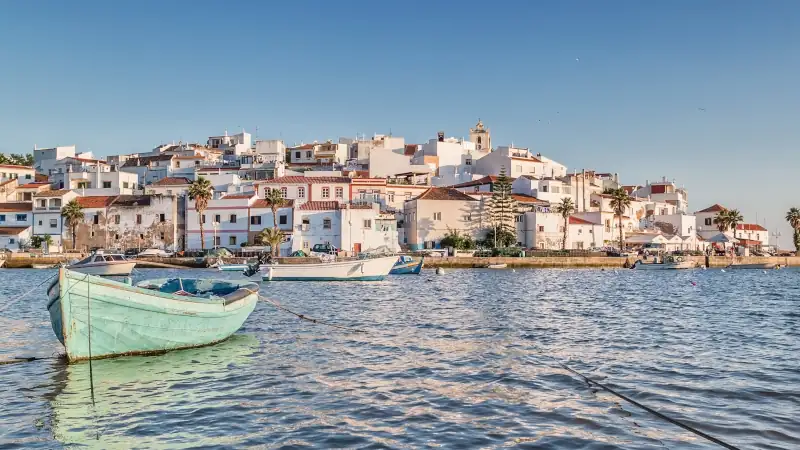
Portugal is the seventh most peaceful country in the world. Crime rates in the Algarve are low.
The region’s 100 miles of Atlantic coastline are punctuated by jagged rock formations, lagoons, and extensive sandy beaches, many boasting coveted Blue Flags from the European Blue Flag Association. In addition, the region boasts 42 golf courses in less than 100 miles and is recognized as a top golfing destination in continental Europe and the world.
The cost of living in Portugal is not as low as it was when we began recommending this as Europe’s secret best. Still, this is a very affordable choice in the context of the Continent.
Portuguese health care is international-standard and ranked by the World Health Organization as the world’s 12th best. Medical tourism is a growing industry. Resident citizens of the European Union and anyone legally working in Portugal and contributing to the local social security system is entitled to use the public health system free or with modest co-payments.
In Ferragudo, the seafood is fresh, the people are pleasant, the service is friendly, the wine a bargain. This is an opportunity to embrace the tranquility of country living that’s just minutes from award-winning beaches and golf courses.
Another hard-to-resist option for escaping to a sweeter, simpler time.
Until next time,

Founding Publisher, Overseas Opportunity Letter

